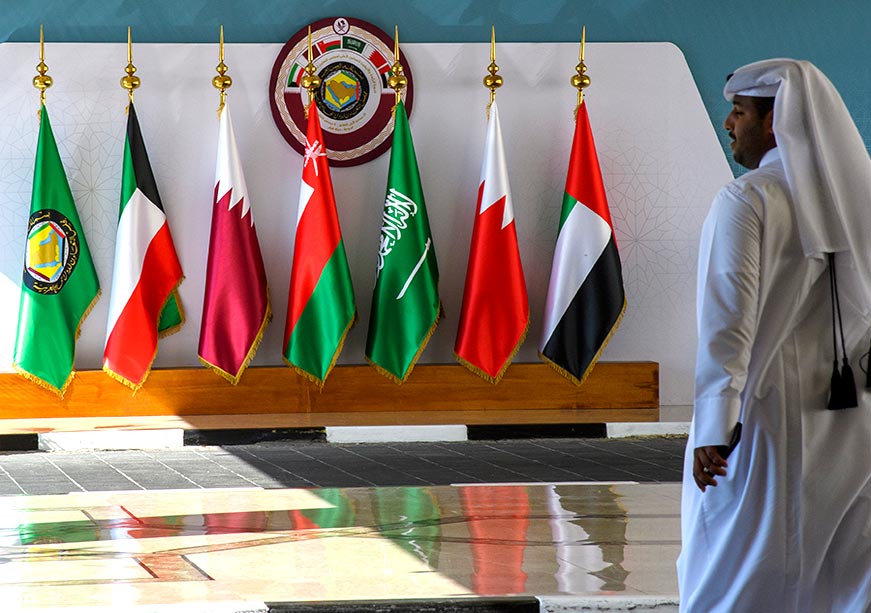-
CENTRES
Progammes & Centres
Location

Image Source: Getty
The economic relationship between Türkiye and the Gulf Cooperation Council (GCC) countries has evolved significantly since the resolution of the Gulf crisis in 2021. The de-escalation and normalisation processes which followed the al-Ula Agreement have created a fertile ground for deeper collaboration, with both sides focusing on enhancing trade, investment, and broader economic cooperation. Despite the potential, there is much untapped opportunity that could elevate these economic ties to new heights. Moreover, the Trump 2.0 era may open new avenues for GCC-Türkiye relations by encouraging pragmatic economic partnerships, reducing reliance on traditional alliances, and fostering a climate where bilateral trade and investment become key priorities.
Türkiye, the largest non-oil economy in the Middle East, is well-positioned to play a significant role in the economic future of the region.
Türkiye, the largest non-oil economy in the Middle East, is well-positioned to play a significant role in the economic future of the region. Its strong manufacturing base, diversified economy, and strategic location in Europe and Asia provide it with a unique advantage. The Gulf countries, on the other hand, led by the Kingdom of Saudi Arabia (KSA)—the largest Arab economy—are working on economic diversification initiatives aimed at reducing their dependence on oil. This common interest in growth and diversification should naturally drive stronger economic collaboration between the two sides.
Despite the potential, the volume of bilateral trade between Türkiye and the Gulf states, particularly Saudi Arabia, remains limited when compared to their collective economic capacities. In 2023, Saudi Arabia and Türkiye signed agreements on investment, energy, communications and the defence industry. Among others, the defence sector has the potential to be the engine of the economic relations between the two countries, as Ankara and Riyadh are currently negotiating a $6 billion defence agreement, including Saudi Arabia’s joining a programme to develop a fighter jet known as KAAN.
The situation is slightly more promising in Türkiye’s relationship with the United Arab Emirates (UAE), which has been growing steadily. In 2023, the UAE ranked the 9th largest destination for Turkish exports valued at US$8.5 billion. Both nations have been negotiating a free trade agreement (FTA) for over a decade, and while significant progress was made in 2024, the final hurdles remain. The challenge lies in reaching an agreement among the six GCC countries, but the potential benefits are undeniable. Türkiye, having long advocated for such an agreement, understands that this could unlock substantial economic opportunities for both sides.
Beyond trade agreements, the geopolitical and economic context remains fluid, especially with the unpredictable nature of US foreign policy under President Donald Trump. The Trump administration's economic policies, including efforts to increase US oil production and reduce oil prices, have indirectly created tensions with the Gulf states. Countries like Saudi Arabia and the UAE, which rely on stable oil prices to fund their economic diversification plans, have been at odds with US oil strategies. Low oil prices hurt their long-term planning, exacerbating the economic division between the GCC and the US under Trump’s leadership.
The Trump administration's economic policies, including efforts to increase US oil production and reduce oil prices, have indirectly created tensions with the Gulf states.
What is more, GCC countries, particularly UAE and KSA, have shown interest in joining BRICS group (originally comprised of Brazil, Russia, India, China, and South Africa) to diversify their geopolitical and economic alliances by gaining more influence in global decision-making, shifting global power dynamics and the transition away from unipolarity. This move can challenge the US leadership in the region, especially under President Trump's “America First” policy, which focused on reducing US commitments abroad and fostering closer ties with traditional allies like Israel and the GCC states. As these countries eye BRICS membership, they may increasingly distance themselves from Trump's policies, seeking new economic partnerships and geopolitical stability that aligns with their national interests. This misalignment of interests could lead to financial pressure from the US, particularly if the GCC countries do not align with Trump’s policies.
Another concern is the US’s potential for escalation with Iran. The Second Trump administration has restored its "maximum pressure" campaign, potentially supporting more aggressive measures, including urging Israel to target Iranian nuclear facilities. This may lead to considerable tension with some Gulf states, particularly in light of the Saudi-Iran rapprochement brokered by China, which has helped reduce tensions and opened new avenues for economic and security cooperation. Under the current geopolitical context, a continuation of policies from the first Trump administration is far from being seamless, as the Gulf states are now much less enthusiastic about the US’s hawkish policies towards Iran from back in 2017. A US-Iran confrontation could threaten the delicate balance between GCC countries’ strategic alliance with Washington and their efforts to preserve stability with Tehran.
Under the current geopolitical context, a continuation of policies from the first Trump administration is far from being seamless, as the Gulf states are now much less enthusiastic about the US’s hawkish policies towards Iran from back in 2017.
Türkiye, on the other hand, faces its own set of challenges in its relationship with the U.S. Along with the political relations, Ankara desires to boost its economic ties with Washington during the Trump 2.0 era. The imposition of sanctions during Trump’s first term, particularly targeting the Turkish economy, has shown the fragility of the economic relationship between the two countries. Türkiye is acutely aware of the risks posed by political tensions, especially regarding tariffs on its iron exports to the US, which could hurt its economy further. Despite this, Türkiye remains committed to strengthening its ties with the U.S. in hopes of boosting economic collaboration. However, the political volatility in US-Türkiye relations remains an ongoing concern.
For both Türkiye and the GCC states, these external challenges may ultimately encourage greater economic collaboration within their region. The economic strain caused by the COVID-19 pandemic and the ongoing geopolitical instability in the region have highlighted the need for greater autonomy and economic resilience. With the possibility of future US sanctions or tariffs looming, both sides may see more incentive to increase bilateral trade, investment, and regional economic cooperation.
While the economic ties between Türkiye and the GCC countries have made significant strides in recent years, there is still much room for growth. Both sides have strong motives to enhance their cooperation, especially in the wake of external pressures, such as shifting US policies and regional uncertainties. The FTA between Türkiye and the UAE could serve as a critical step forward in unlocking the vast potential of this economic partnership, benefiting not only Ankara and the GCC but the broader region as well. However, the challenge lies in navigating both the complex geopolitical dynamics and the evolving global economic landscape, which will require careful negotiation and strategic alignment in the years to come.
This commentary originally appeared in ORF Middle East.
The views expressed above belong to the author(s). ORF research and analyses now available on Telegram! Click here to access our curated content — blogs, longforms and interviews.

Gamze Coskun Bakir is a researcher and consultant on the MENA region, focusing on the Gulf, Levant, and Turkiye. She has previously worked at think ...
Read More +
Nesibe Hicret Battaloglu (Qatar University) is a researcher in the Gulf Studies Center at Qatar University. Currently, she is also a PhD Candidate at the ...
Read More +